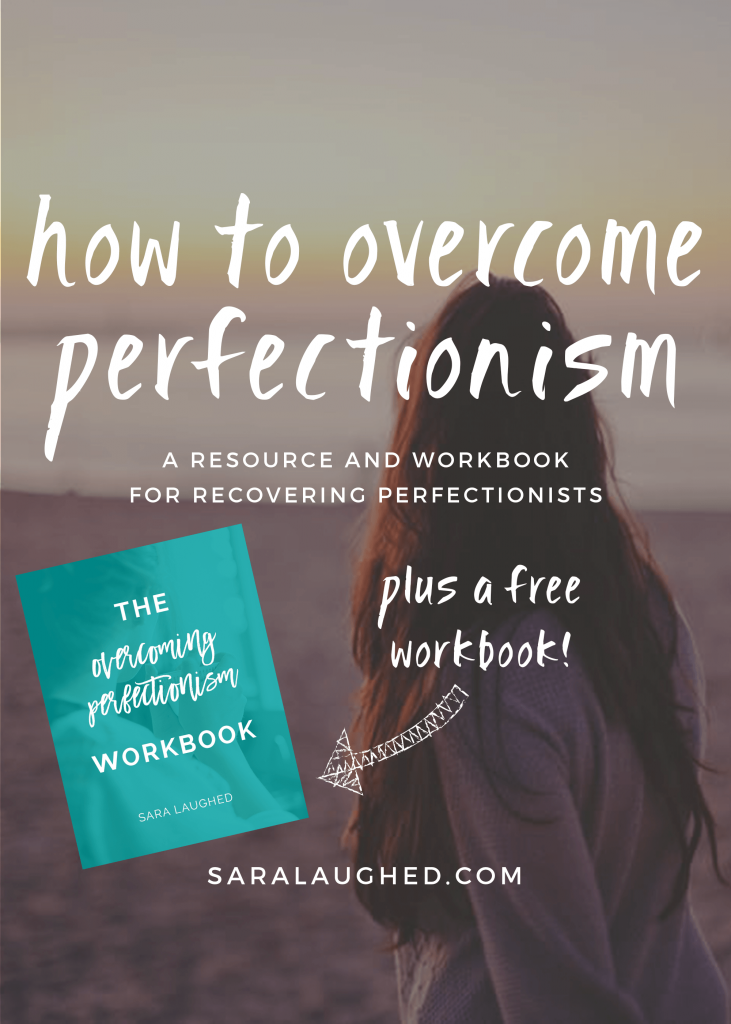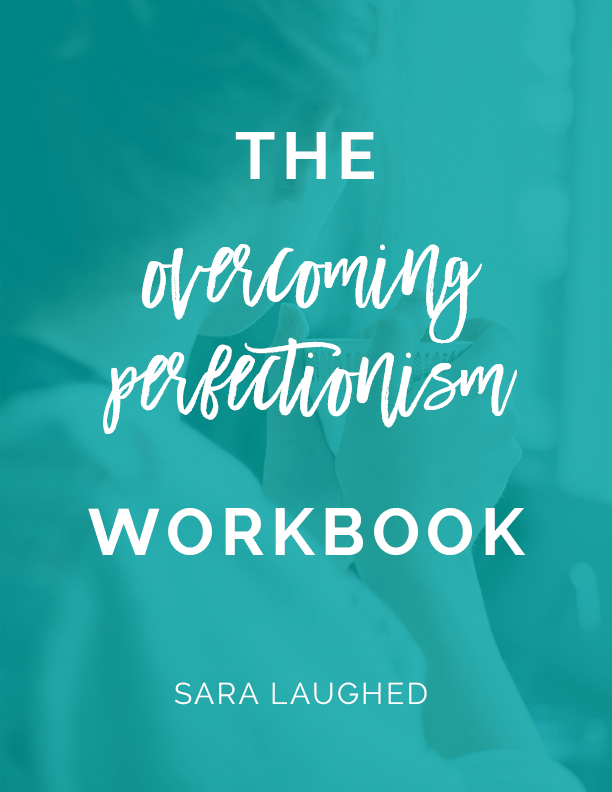Perfectionism might not seem like a bad problem to have when you’re on the outside. But if you’re a perfectionist like me, you know the struggle: staying up to 3AM to finish the graphics for your 5 minute presentation the next day, staring at a blank screen because you can’t think of the “perfect” first sentence, being afraid of trying something new because of the learning curve. High standards are great, but impossible standards get you nowhere except frustrated, unhappy, and overwhelmed.
If this all sounds a little too #relatable to you, these tips might help you let go and move forward.
This post also comes with a free How to Overcome Perfectionism workbook for those of you who want to follow along. It’s specifically designed to help you identify and address your perfectionistic habits, set goals, and track your journey to healthier thinking. You can download it for free here.
What even is perfectionism?
Having high aspirations and wanting to succeed is good, but when does it become too much of a good thing?
To find out, take a look at your standards. Standards are the ideas or definitions we keep in mind to define success for ourselves. For example, when I’m working on a college paper, my standard may be any of the following:
- A paper that meets the requirements of the assignment.
- A paper that shows my skill and independent thought.
- A paper that is better than every other students’ paper and gets an A.
Some of those standards are higher than others. The first two standards are focused on what I can do and control: writing an assignment that meets the requirements and shows my skill. These standards could help me write a paper that I’m proud of, regardless of what grade I get.
But the third standard is based on things I can’t control: how good everyone else’s paper is, and the grade the professor gives me. If that’s my goal, I’ll probably never get to a level that I am proud of; someone could always write a better paper, and I don’t know what grade I’ll get.
So how do you know if your standards are unhealthy, and you may struggle with perfectionism? Let’s take a look.
Am I a perfectionist?
Try to answer these questions honestly. You can also find them, and some room for your answers, on page 4 of the workbook.
- Do I have to work very hard to meet my own standards?
- Do I want to be the best in everything, even if it’s not an interesting or important area for me?
- Am I very conscious and aware of my mistakes?
- Do I often criticize myself for even small mistakes?
- Do I often get angry, depressed, frustrated, or overwhelmed when doing work?
- Do I judge myself on my ability to meet my standards?
- Do I feel like my assignments are never “done” because they could always be better?
- Do my standards make it harder for me to finish things, meet deadlines, or work in group projects?
If you answered “yes” or “sometimes yes” to four or more of the above questions, you probably struggle with some degree of perfectionism. But perfectionism can happen in area of your life, including the ones I’ve listed below. In which of these areas do you feel you feel like your standards might be a bit too high?
- Academics
- Having a clean and organized room
- Lifestyle and health
- Hygiene and appearance
Wanting to change
So you may have some areas in your life where you have unhealthy standards. Even if you recognize that you struggle in those areas, you may not want to change. There are, after all, benefits to being a perfectionist. For example:
- You are often a good student, or a hard worker
- You may be organized
- You may often be prepared for situations or outcomes
- It may make you feel good, special, and prepared
But if you’re honest with yourself, you might also see some downsides:
- Lack of free time due to constant work, tweaking, and polishing
- Never feeling good enough, or accomplished enough
- Catastrophic thinking (e.g. “If something is done wrong, it’s all my fault.”)
- Low self esteem (e.g. “If I do something wrong, it means I am a terrible person.”)
- Procrastination (e.g. “I’m so afraid of making a mistake that I never start!”)
- Lack of productivity due to high standards
- Fear and anxiety about making mistakes
- Depression due to struggling to meet your own standards.
Do any of these negatives feel real to you? If so, it is time for a change.
Taking stock of your standards
Why adjust your standards? Because perfectionism is both a thought and a habit. By adjusting the way you think about success, work, and yourself, and by changing how you respond to them, you can start to chip away at the hold that perfectionism has on you. This technique is taken from the stunningly helpful Perfectionism in Perspective class offered by the Centre for Clinical Interventions, available for free here. Many of the questions below are modeled on different sections of their modules.
Your standards should be FAR: flexible, attainable, and realistic. You shouldn’t have to bend over backwards to meet the standards that you set for yourself; instead, they should be able to bend to your life and needs (flexible). And you shouldn’t have to work for something that is unrealistic or unattainable for you: the standards you set should be ones that, with a little hard work and dedication, you can reach (attainable and realistic).
Make a list of some of the unrealistic standards you may have in your life. Are they flexible, attainable, and realistic? If not, take those to the next section.
Adjusting your standards
Using the list you made above, find one or two standards that contribute the most to your general stress levels. For example, the standard that I struggle with the most is that I feel I need to get an A in every class, and that anything below an A is failure. This is ridiculous, of course; while it’s nice to aim for As, it’s unrealistic to get them all the time.
Select the standard that stresses you out most. Now look to pages 6 and 8 of the workbook to answer some questions about that standard. The questions are structured to help you change your mindset about the standard and come to terms with changing it. When you finish page 6, come back to this post for the next step.
Setting goals
You’ve probably heard about SMART goals over and over. If not, here’s the idea: any goal you set should be
- Specific
- Measurable
- Attainable
- Realistic
- Time-sensitive
Just like your standards need to be realistic, your goals need to be too. The goal-setting portion of the workbook can be found on pages 7 and 9. Let’s take my standard from part 5 and answer the questions found on page 7 together.
What is the unrealistic standard that I would like to change?
I will only be a successful student if I get an A in every single class.
What would be a more realistic standard?
I am a successful student if I do my best to learn the material. My grades do not define my success.
What is one habit that would help me change my standard?
Balancing my work with self-care and free time.
What is a way I can act this out in my day-to-day life?
Daily yoga practice; 30 minutes of reading before bed; meals with friends instead of over work.
What time frame do I have to enact this practice?
One month.
Is it okay if I make mistakes along the way?
YES!
Answer these questions for yourself using the workbook. I’ve included enough pages for two standards in this section of the workbook, so feel free to answer them for either one or two of the standards you identified in the previous section. Try to focus on just one or two before moving on to more. This will help you with your changes of success.
Dealing with hurdles
As you try to adjust and change your standards, you make likely come across some problems such as:
- Fear of change (e.g. “If I lower my standards, my grades will suffer.”)
- Reacting to mistakes (e.g. “I slipped up; I will never be able to overcome this.”)
- Circumstances leading you to old behaviors (e.g. a breakup causing you to return to your old standards as a coping mechanism).
These things are all completely normal and natural parts of the process of overcoming perfectionism! But we can make them easier when they do happen by planning ahead. On page 10 of the workbook, answer the questions to help you identify what kind of hurdles in thought or behavior you may face, and make plans for how to deal with them. For the last question on page 10 (“What are some things I could say to feel better when dealing with the hurdle?”), you may struggle to come up with things to say. That’s where our next section comes in.
Mindset
Mindset is one of the most important ways you can set yourself up for success when dealing with any problem. Today, we’re adjusting our mindset around perfectionism and success. But often, changing our thoughts is easier said than done. Here are some ways you can do it (and some inspiration for the last question on page 1o!).
a. Follow up negative thinking with more realistic statements
Sometimes we get bogged down by negative thinking the second we make a mistake. As perfectionists, it’s easy to turn a simple error into a statement about who we are as people: “I had a typo in the first page of my essay. I’m a terrible student and my professor must have no respect for me now. I will never live down this embarrassment.”
When faced with this kind of black-and-white, catastrophic thinking, it’s helpful to follow up our negative thoughts with more positive, realistic ones. Every time you notice yourself getting overwhelmed, consider some of the following statements. Repeat them to yourself:
- Nobody is perfect.
- Everybody makes mistakes.
- Making mistakes is natural and human.
- It’s okay if somebody dislikes or disagrees with me. No one is liked by everybody in their life.
- I am okay exactly as I am, mistakes and all.
- I accept and love myself exactly as I am.
- It’s better to have something done imperfectly than not done at all.
These statements are good examples of the kind of things you may find helpful when answering the final question on page 10.
b. Reframe the issue
Imagine something like this had happened to a good friend of yours, rather than to yourself. What would you tell them if they were in your situation? Would you assume your friend was lazy, bad, or a terrible person because of their mistake?
The same goes for completing an assignment or something you would usually take a perfectionistic approach to. Would you judge your friend’s worth, intelligence, or general success on the basis of a single paper or test? I hope not!
c. Take a step back
One of my favorite exercises when I get overwhelmed with negative thinking is to take a step back and re-examine the issue from the future. In five years, how much will this moment, mistake, or assignment matter? How about in ten? Will I even remember it? Consider this as you process your assignment or what you are dealing with.
d. Laugh and forgive
No surprise that this is my final piece of advice for changing your mindset. I love laughter, both as a lifestyle (take life as it comes, and don’t take it too seriously), and as a practice to help us move past mistakes and enjoy life. When you make a mistake, or find yourself getting overwhelmed by an assignment, try to laugh about it. You’re human, and you make mistakes. They’re not a big deal, and they do not define you.
9. Journaling
The last piece of advice I have as you try to track these goals and move towards less perfectionistic habits and thoughts is to journal. Whether in a planner, a notebook, or a diary you bought just for the occasion, journal your thoughts and feelings as you change your thoughts and lifestyle. Use your entries as a chance to remind yourself of the statements above, to reflect on your progress, and to grow as a person. You will find some great questions to keep in mind as you journal on page 10 of your workbook.
Resources on How to Overcome Perfectionism
In my research for this post, two websites really stood out to me. The first is this great PDF by AnxietyBC, with tons of tips and information on understanding and moving past perfectionism. The second is this absolutely great free resource by the Centre for Clinical Intervention, which has nine modules for dealing with, tracking, and understanding perfectionism. This resource was major in helping to set up this post and workbook, so thank you to the CCI! Be sure to check out their website and resources here. They’re amazing!
I hope these tips will help you deal with perfectionism and overcome your negative thinking. But it’s time to hear from you!







I definitely relate to this post! I cannot wait to check out the printable. Thanks for so much helpful knowledge 🙂
XO, SS || Seersucker Sass
I was the ultimate perfectionist in high school, and I think came out of it in the transition to college!
Wow, what a great article. I wouldn’t call myself a perfectionist, in fast, I could probably benefit from being more of one!
This is a really informative and helpful post! Perfectionism is something many people deal with, but especially, college students. I know I’ve had my fair share of it! Can’t wait to check out the printable!
Lauren | http://www.alilstyleblog.com
I am trying to be less of a perfectionist and this is so helpful. Thank you so much for sharing this!
XO, Brooke
https://livethepreplife.blogspot.com
This was really helpful! I’m about to graduate this spring, but I can totally relate to this. I’m going to share it on my major’s private Facebook page, if that’s okay with you? I think some of my classmates could benefit!
xoxo, SS
The Southern Stylista
Hi Jordyn! That would be so great – I hope it helps many people. Thank you for sharing and have a great day <3
This was a FANTASTIC post and very helpful to read. I can see you put a lot of thought into this post and I really appreciate it.
XO,
Hannah from HMS Jewels
http://www.hmsjewels.com
Thank you so much, Hannah! I am glad it helped you!
What a wonderful resource for college students!
xo,
Stephanie
Diary of a Debutante
http://www.thediaryofadebutante.com
I was at the top of my class in high school so when it came to college, I definitely struggled with perfectionism. These are incredible tips. I also adopted a mentor that helped me while I was at school. xx Merisa | Monogrammed Magnolias
I’m so glad that your mentor helped you! What kind of mentoring did that involve?
🙌🙌🙌🙌 so helpful. I’m in my final year of college and I am such a perfectionist. I needed help letting go a little so I can have time for other things. This article helped tremendously.
Wow, I absolutely love this, Sara! I’m definitely a perfectionist and so much of this was so relatable! I actually just wrote my own blog post today about perfectionism before finding this one on Pinterest. Can’t wait to read more from you! 🙂